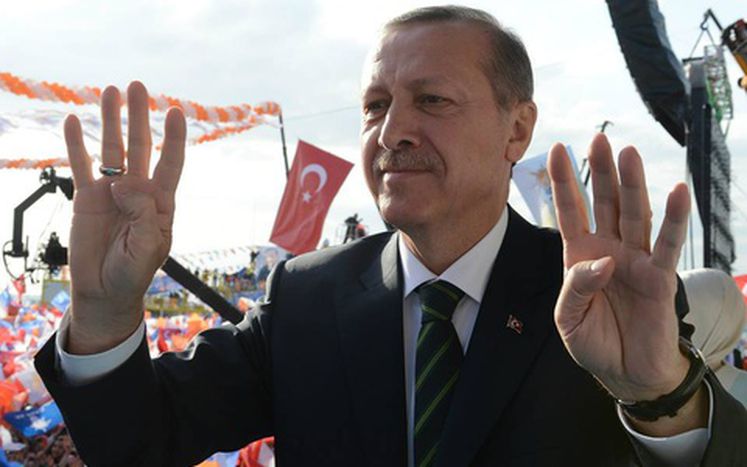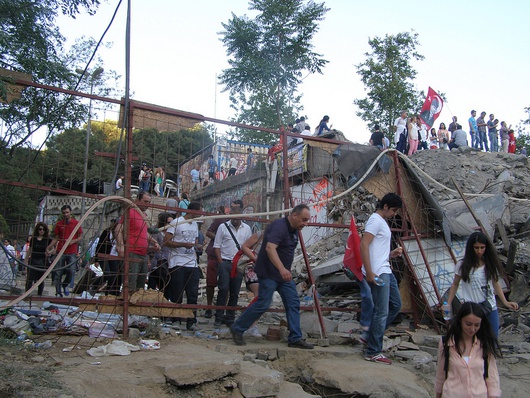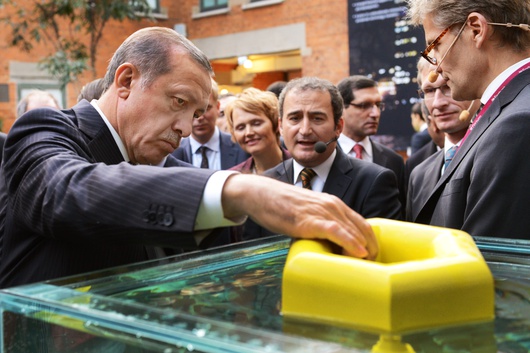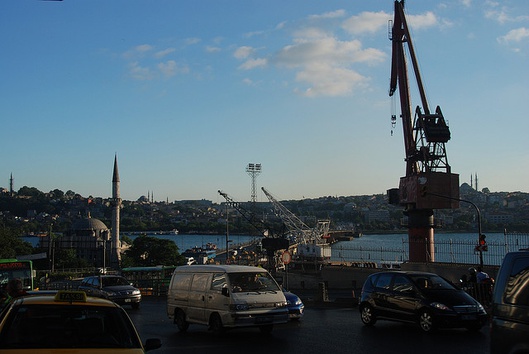
Turkey: Make or break time for Erdogan
Published on
With the political integrity of Europe’s eastern front hanging by a thread, it is easy to forget the unrest that shook Turkey last year. As the Crimea monopolises the media, people would be forgiven for thinking that all was well in Turkey once more. A closer inspection reveals cracks in the façade that has been so carefully constructed by Erdogan and his seemingly omnipotent band of brothers
As the countdown begins to the general elections in June 2015, the pressure is mounting on the ruling Justice and Development Party and it’s leader as claims of corruption and an increasingly authoritarian stance threaten its stability. Prime Minister Recep Tayyip Erdogan’s grip over his country and his people has been tightening gradually during his ten years in power but only in the last few years have his citizens begun to stand up against what they perceive to be an attack on the Turkish republic, and worst still, an attack on the father of modern Turkey, Mustafa Kemal Ataturk. Restrictions on freedom of speech, the independent press and the government’s refusal to acknowledge the rights of the Turkish LGBT community have angered the people and in particular the youth, who feel that the country is regressing instead of embracing the lifestyles and rights of a modern European society.
Turning off the tap
Along with this comes the religious influence that Erdogan has imposed. Although Turkey has a large Islamic majority, since the creation of the republic in 1923 Turkey is a secular state with a large multi cultural population. This secularism, however, has been threatened by Erdogan’s increasingly Islamic influence with moves to tighten the country’s alcohol laws. A 2011 law (since retracted) raised the drinking age from 18 to 24. These public concerns culminated in the civil unrest that exploded last May, with it’s epicenter being Taksim Square and the surrounding Gezi Park in Istanbul. In front of the world’s media, Erdogan asserted his authority with a brutal police backlash against protestors. Ultimately the movement was quashed.
imposed. Although Turkey has a large Islamic majority, since the creation of the republic in 1923 Turkey is a secular state with a large multi cultural population. This secularism, however, has been threatened by Erdogan’s increasingly Islamic influence with moves to tighten the country’s alcohol laws. A 2011 law (since retracted) raised the drinking age from 18 to 24. These public concerns culminated in the civil unrest that exploded last May, with it’s epicenter being Taksim Square and the surrounding Gezi Park in Istanbul. In front of the world’s media, Erdogan asserted his authority with a brutal police backlash against protestors. Ultimately the movement was quashed.
So, how has Erdogan and his Justice and Development Party maintained power for so long? The truth is for the majority of his tenure in power, Erdogan has actually increased his support amongst the Turkish people. During the Erdogan decade, Turkey has undergone a great deal of change and progression on the global scene and has firmly established itself as a key player in both Europe and Asia. With GDP growing by 64% between 2002 and 2012, Turkey became a global economic powerhouse and an important geopolitical influence.
 In my home city of Istanbul the changes are clear to see. A new brand new railway tunnel built under the Bosphorus Strait links the great continents of Asia and Europe. Beautifully maintained gardens grace the length of the highways and imposing government buildings have sprung up across the city. An abundance of high end sports cars, 4x4‘s and speedy little hatchbacks paint an optimistic picture of Turkey’s economy today.
In my home city of Istanbul the changes are clear to see. A new brand new railway tunnel built under the Bosphorus Strait links the great continents of Asia and Europe. Beautifully maintained gardens grace the length of the highways and imposing government buildings have sprung up across the city. An abundance of high end sports cars, 4x4‘s and speedy little hatchbacks paint an optimistic picture of Turkey’s economy today.
But where has all this money come from?
Erdogan supporters laud clever leadership and successful economic policies. Political stability led to the kind of economic stability rarely seen under previous governments, which were typically short term coalitions. Thanks to this stability, foreign investment exploded, totaling $123.7bn from 2002-2012.
On the other hand, Erdogan cynics blame corruption. Recent developments suggest that Erdogan and his government are deeply involved in corruption. Many of the country’s richest and most influential businesses are implicated. A secret phone recording of a conversation between the Prime Minister and his son was released on national television. They are allegedly discussing the need to move a large amount of money out of their house due to a danger of it being uncovered. Of course the Prime Minister refutes the allegations and claims the recording is fake. Another scandalous recording was released of a conversation between Erdogan and the head of a leading Turkish news network. The Prime Minister demands the network cuts its coverage of an opposition leader, and the network chief submissively agrees.
Recent developments suggest that Erdogan and his government are deeply involved in corruption. Many of the country’s richest and most influential businesses are implicated. A secret phone recording of a conversation between the Prime Minister and his son was released on national television. They are allegedly discussing the need to move a large amount of money out of their house due to a danger of it being uncovered. Of course the Prime Minister refutes the allegations and claims the recording is fake. Another scandalous recording was released of a conversation between Erdogan and the head of a leading Turkish news network. The Prime Minister demands the network cuts its coverage of an opposition leader, and the network chief submissively agrees.
Whether these recordings are true or not remains to be seen and in any case, whilst Erdogan is in power it seems unlikely that such evidence can be proven against him as he seems to have the ability to manipulate any news or event to suit himself and his party. This increasingly iron fist approach is only highlighted by Erdogan’s calculated moves to replace leading military figures with pro-Justice and Development Party leaders to consolidate his power in a country renowned for it’s military coups. Erdogan’s recent threat to ban Facebook and Youtube was fortunately shot down by President Abdullah Gul.
Ground Zero: Turkey - The Protesters of Gezi Park
No alternatives
The most recent poll figures suggest that Prime Minister Erdogan and his AKP party still maintain a healthy 40% of the vote. Despite increasing discontent with the government, people are faced with the dilemma of having no attractive alternative. Erdogan’s nearest rivals, the Republican People's Party (CHP) still have a lot of work to do to convince the Turkish people.
2014 promises to be a monumental year for Turkey. Local elections are only weeks away, and observers predict that the winner of these will go on to win the next general election. However, in the wake of recent events, it remains to be seen if Turkey still trusts Prime Minister Erdogan.



